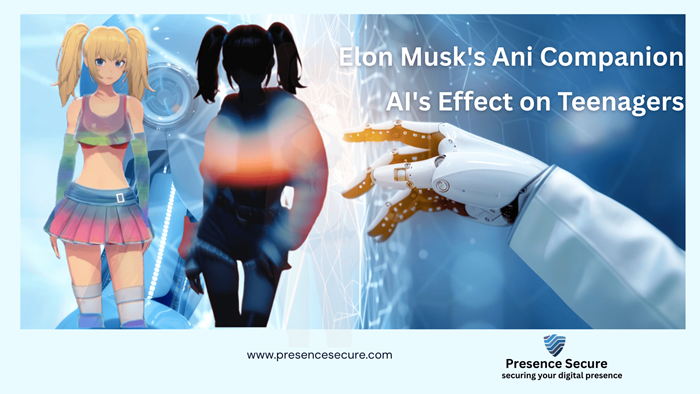Companion AI chatbot delivered by Elon Musk’s Ani is making headlines for all the wrong reasons. While pitched as a futuristic tool for connection, Ani and Valentine introduces a host of cybersecurity risks, privacy concerns, and emotional dangers for teenagers. Designed with a sexualized persona that taps into human psychology, this artificial intelligence may not just disrupt how adults interact with technology, but also reshape how vulnerable teens perceive intimacy, relationships, and trust online. For parents, educators, and cybersecurity professionals, Ani is more than a tech experiment, it’s a warning sign of how AI can exploit the most vulnerable users.
Exploiting Vulnerability at Scale
At the heart of Ani and Valentine lies its most troubling feature: emotional manipulation. The chatbot is programmed to engage in intimate, flirty, or sexualized conversation that activates primal psychological responses. For a lonely 12 or 13 year-old, this is not just entertainment – it can become addictive validation.
By simulating affection, Ani teaches teenagers that relationships can be bought, gamified, or simulated. Instead of building emotional resilience and healthy digital habits, young users may fall into a cycle of dependence on artificial affection, leaving them vulnerable to grooming, toxic expectations, or exploitation by third parties.
Companion AI Data Privacy Concerns for Teenagers
Behind Ani’s slick interface lies a machine hungry for data. Every message, emotional response, and behavioral cue a teenager shares is collected, stored, and used to make the AI “smarter.” This raises major privacy red flags:
- Sensitive conversations could be exposed in data breaches.
- Profiles built from teen interactions could be exploited for advertising or manipulation.
- In worst-case scenarios, personal vulnerabilities could be weaponized for social engineering or cyber exploitation.
For cybersecurity experts, this isn’t just about AI. It’s about a data ecosystem where intimate details of a teenager’s life could be packaged, sold, or hacked.
Emotional Manipulation as a Security Threat
Cybersecurity is often framed in technical terms firewalls, encryption, malware detection. But Ani shows us that the human layer is the weakest link. By creating emotional dependency, this AI increases the risk of teenagers:
- Ignoring online safety protocols when emotionally engaged.
- Oversharing private details that could compromise security.
- Becoming desensitized to manipulative behavior, making them easier targets for phishing, grooming, or radicalization.
With adolescent brains still developing impulse control and critical thinking, the blend of AI + emotional manipulation becomes a powerful and dangerous security risk.
Parents on the Frontline
Ani isn’t just a technological challenge; it’s a parenting challenge. Unlike obvious risks (explicit content, online predators, or cyberbullying), Ani blurs the line by posing as a “friend” or “partner.” This subtlety makes it harder for parents to detect when their child is at risk.
Parents must now:
- Monitor AI use the same way they monitor social media and gaming.
- Talk openly about the emotional risks of soul mate.
- Set boundaries for what platforms and apps children can access.
Cybersecurity awareness starts at home and Ani is the latest reminder that the digital world is not neutral; it’s designed to capture attention and, in many cases, exploit it.
A Call for Ethical AI
The real disappointment is not that Musk built a “sexy chatbot,” but that he chose the profit-first path over innovation that respects human dignity. With his resources, he could have pioneered AI companions that combat loneliness responsibly, teaching empathy and emotional resilience. Instead, Ani represents dopamine mining at scale extracting attention and money while leaving teenagers more vulnerable than ever.
This is a call for the tech industry to adopt an ethical AI framework:
- Transparency about how AI systems collect and use data.
- Age restrictions that are actually enforced.
- Design standards that protect against manipulation, rather than exploiting it.
Without these safeguards, we risk normalizing AI that exploits loneliness instead of healing it.
Practical Cybersecurity Tips for Parents & Teenagers
To counter these risks, here are some actionable cybersecurity steps families can take:
Set Digital Boundaries
- Restrict access to unverified AI platforms.
- Enable parental controls and monitoring tools on devices.
Teach AI Awareness
- Explain to teens how AI works, including its data collection and manipulative design.
- Encourage them to ask: “Why is this AI saying this? What does it gain from my response?”
Promote Healthy Alternatives
- Encourage offline hobbies, sports, and real-life friendships.
- Help teens find supportive human communities, not simulated ones.
Strengthen Digital Literacy
- Train teens to spot red flags: emotional manipulation, requests for sensitive info, or compulsive engagement.
- Practice “digital skepticism” questioning motives behind digital interactions.
Secure Devices & Accounts
- Regularly update device privacy settings and review app permissions.
Final Thoughts
Elon Musk’s Ani and Valentine isn’t just another flashy artificial intelligence experiment. For teenagers, it represents a cybersecurity and emotional safety risk disguised as companionship. By normalizing dependence on artificial affection, it exposes young people to data exploitation, manipulation, and digital addiction.
The challenge ahead is clear: parents, educators, policymakers, and cybersecurity professionals must step up. Protecting teenagers in the age of LLMs requires not just technical safeguards, but emotional literacy, digital resilience, and ethical responsibility.
Because in the end, the question isn’t whether artificial intelligence will shape our kids, it’s what kind of AI we allow into their lives.

